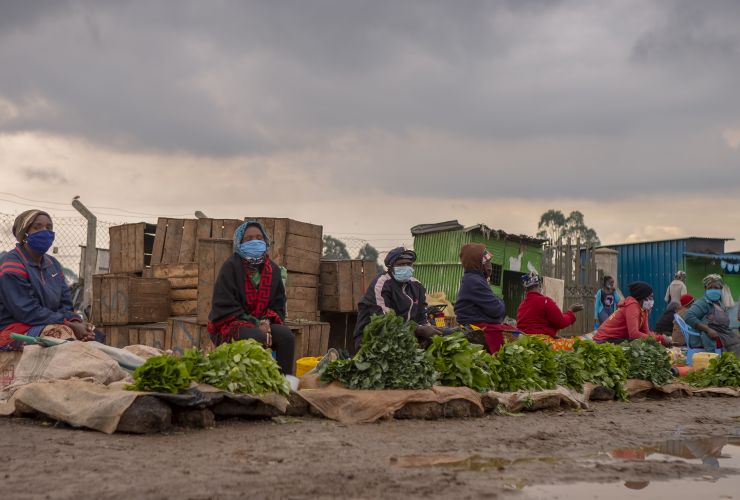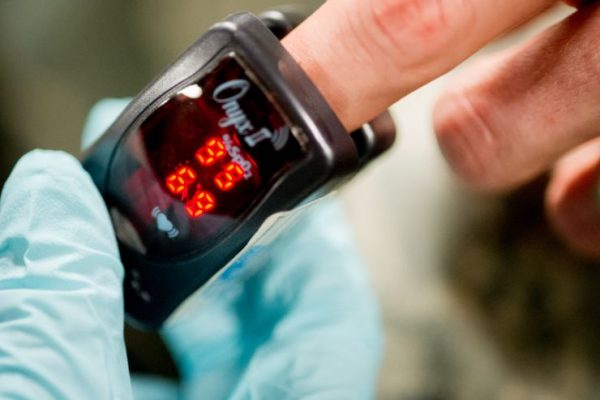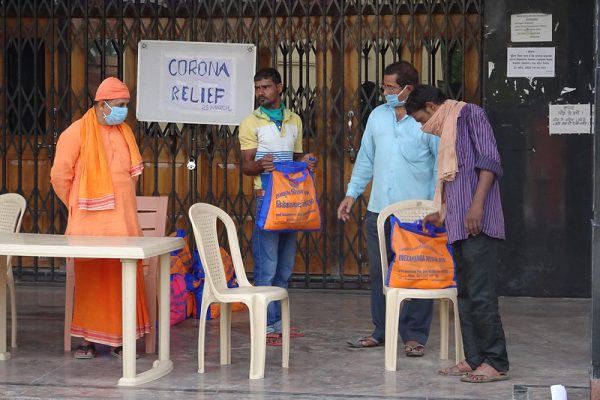“Why aren’t more Africans dying of COVID-19?”
Almost every major international news outlet has asked a variation of the question. Some speculate that something structural or physiological has dampened the impact of COVID-19 on Africa’s population; otherwise, Africa would be faring worse. Others argue that African governments are simply doing a better job of managing the disease than other regions, despite ample evidence to the contrary. Neither analysis reflects the complex realities of COVID-19 in Africa.
Experts rightly wonder why their predictions were wrong, but we should resist framing the question in violent and partial ways.
The question itself, in its crudest form, has provoked considerable, justifiable anger on social media in various African countries. Yet as the deaths mount in Brazil, India, the United States, and the UK, and as Europe prepares for its second wave, the official death toll in African countries remains low. As of October 13, there have been just over 38,000 deaths in a continent with a confirmed caseload of over 1.5 million. Even in South Africa, the most severely affected African country, confirmed deaths are far fewer than predicted. Indeed, experts are left wondering why their predictions were wrong. But wondering why predictions were wrong differs from a crude question outside of a research context. The latter relates to the ways that knowledge about Africa is constructed and the loaded, false premises that frame important issues in partial and violent ways. After all, to ask why more Africans aren’t dying of COVID-19 is to suggest that more Africans should be dying of COVID-19—in a normative rather than a descriptive sense. It exposes the expectation that when the world suffers, Africa must suffer more.
We can learn collectively from the questions we ask. Knowledge-making is about grappling with useful questions—those that move humanity toward a greater understanding of our shared circumstances. But questions that distract from meaningful comparisons dominate the current moment. “Why aren’t more Africans dying of COVID-19,” like so many questions about Africa, fails to illuminate.
Some of the false frames of the question are obvious. ‘Africa’ is a geographical construct that serves specific social and political functions, but does not accurately represent the variation and complexity of the second largest continent on earth. Regarding COVID-19, differences abound. In East Africa, where I sit, countries such as Tanzania are not measuring its spread; in Kenya and Uganda, the methods used to count cases change constantly and widespread testing capacity is lacking; Ethiopia, Sudan, and Somalia are navigating the pandemic under complex political situations. Every country is different; ‘Africa’ is a useless analytical construct.
African experts have conceded that the predictions were based on the assumption that African governments would not act in the early days of the pandemic.
The word “more” also presents a problem: the reader might wonder, “more” compared to what? Predictions that were made about the trajectory of the disease? African experts, like the WHO Africa office, have conceded that the predictions were based on the assumption that African governments would not act in the early days of the pandemic. Yet not only did they act, they took drastic measures, such as extreme lockdowns that stalled economies and shut down schools, universities, and religious institutions. Several countries also enforced mandatory mask regulations earlier than countries elsewhere. This confounded the underlying presumption that African societies would do nothing.
“More” also suggests a loaded comparison: because COVID-19 has had a devastating effect on Europe and North America, and indeed parts of South America, Africa could not have been spared. Perhaps the long shadow that Western imperialism still casts on the continent encourages the lazy tendency to view Africa through the lens of the United States’ and Europe’s devastating experience, encouraging the assumption that Africa’s trajectory must either mimic the West in extension or opposition, rather than having its own trajectory produced by regional and national contexts. It bears repeating that Africa is not the anti-Europe.
If useful questions avoid lazy and empty comparisons, then what should we be asking? One useful question would flip the gaze back at Europe and North America, asking why so many people there have died of COVID-19? In its September 24 briefing, the WHO’s Africa office hinted at structural issues that have made the virus spread faster amongst vulnerable populations in those countries, raising questions that demand political action in coming years. Families in the West, and more and more in the East, increasingly place elderly relatives in nursing homes. We should ask why societies—both capitalist and nominally communist (like China)—cannot sustain multi-generational families with complementary roles for all members. Perhaps we should examine the social and labor arrangements that make it impossible for families to provide substantive care for older relatives within the family network and necessitate the outsourcing of care?
One useful question would flip the gaze back at Europe and North America, asking why so many people there have died of COVID-19.
We should also ask how the ways our cities are structured create vulnerabilities. The United Nations Human Settlements Programme estimates that by 2050, over half of the world’s population will be living in cities. Yet the structure of the metropolis is part of the reason why COVID-19 has torn through many of the world’s wealthier countries. The problem is not just the human density of cities, but the pressure to circulate constantly, entering and leaving multiple spaces—the office, the gym, the supermarket, the nail salon, the barber—as a marker of urban vitality (usually accompanied with prohibitions on loitering). This is also a way of promoting the economic health of the whole country. Why don’t our urban economies allow us to stay still and wait for the worst of the pandemic to pass? We also have to think about the exploited underclass that makes city life possible in so many of the larger metropolises—the migrant workers of New York, London, and Singapore who are critical to local economies but locked out of quality healthcare. And we will have to consider why cities such as Auckland and Barcelona—that provided not just healthcare, but also financial support to everyone regardless of national origin—fared better than those cities where unequal access is structural.
To question why COVID-19 is having one trajectory in one place and not in another can be a useful comparison, if it takes into account policy measures, local contexts, community responses, and the evolving state of knowledge about the disease. The earliest dire predictions of the trajectory of COVID-19 in Africa were stark and depicted the worst-case scenario so that people could act urgently. People acted and, in most African countries, senior policy officials didn’t lose time casting doubt on the severity of the disease or debating the usefulness of masks—the single tool that has proven most useful in slowing the spread of the disease—as they did in the UK or the United States. The head of the CDC in the United States has said that masks are probably more effective in controlling COVID-19 than a vaccine would be for the foreseeable future. Why are people in the United States still arguing about them? What about politics in the United States and parts of Europe gives it an outsized impact on public health? That question can illuminate. Good questions don’t ask why more Africans aren’t dying—they explore what officials did right now that the worst of the crisis has been deferred or avoided, and what we can learn from it.
Other useful comparisons might look at the trajectory of COVID-19 in specific African countries alongside that in countries with similar economies and climates. For example, why was Ecuador devastated by COVID-19, while Kenya experienced a slow progression of the disease? To what extent does this reflect the fact that, in April, Kenya made masks mandatory in public places and closed down schools, religious buildings, and other places where large numbers of people might gather? Though some argue that the numbers can’t be trusted because of the differences in testing regimes, comparing the trajectories of similarly situated countries is not useless; we can ask questions about the key moments of change. At what point did the graphs of deaths and cases change direction, if at all, and why?
Useful questions set aside presumptions and biases about how the world must work and invite us to imagine alternatives. Those questions will be invaluable in reconstructing society in the wake of COVID-19.
Useful questions may reveal just how loaded our daily discourse about this pandemic has become. If the trajectory of COVID-19 in the majority of African countries is consistent with that of countries that took early action to flatten the curve, many European and North American countries will have to confront the reality that their politics is broken and their policy making is not always best. The question interrogates the current global order, challenging normative ideas about how neoliberal states must be structured.
The art of asking useful questions demands that we push past light description to consider what drives each society forward. Useful questions set aside presumptions and biases about how the world must work and invite us to start imagining alternatives. Useful questions see that societies are more than just economies that must grow indefinitely regardless of how many people die in the process. And those questions will be invaluable in reconstructing society in the wake of COVID-19.
When we displace closed-ended presumptions of how the world must work with the prospect of how the world could work, suddenly the future looks less inevitable and more like the consequence of collective choice.









